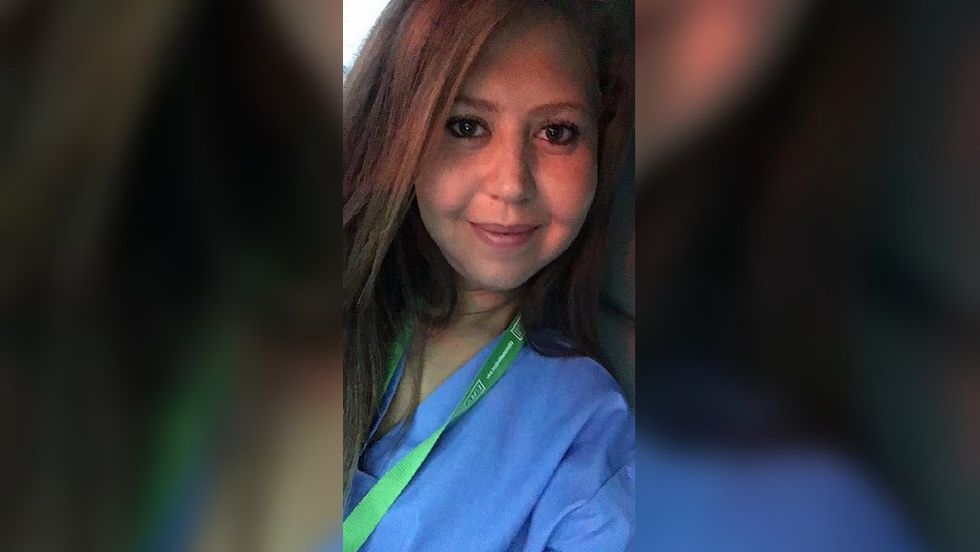At first glance, 23-year-old Gabriele Morales is just like anyone else. She goes to school, spends time with her best friends and has a close relationship her mother.
She regularly dotes on her two dogs. A Rottweiler and an Australian Shepherd-Great Dane mix. She calls herself a dog mom and spoils her babies, Zeus and Jax.
She adores Justin Bieber. Tags her best friends on Facebook posts or funny memes that remind her of them. She recently got out of a long-term relationship and is now single. She is just about to finish her externship and has dreams of becoming a nurse practitioner. Her friends and family all know her as Gabi.
At first look, she is just like any of us. It isn't until you get to know her that you realize she is going through something most 23-year-olds do not.
She was born with a kink in her ureter which caused one of her kidneys to form only 10 percent and another not at all. The kink was repaired when she was a baby and she was able to live with one kidney until she turned two.
At two years old she was put on dialysis. Just a month before her fifth birthday, her father donated his kidney to her. She was finally healthy. For 18 years, she was able to live a normal life
Her donated kidney was ultimately rejected in March 2015.
"Because of the rejected kidney, I have a PRA antibody level of 99 percent. This means I’m a harder match. I only match about one percent of the population. So because I’m a hard match, it’s critical I find a perfect match".
"On dialysis, I never have energy. I can’t shower because of my catheter. My treatment on my machine is nine hours but I have to do a treatment manually every day. That makes the whole treatment a little over 10 hours total, which is a pain to work around. I can’t swim. And because my treatment is so long sometimes I don’t have enough time in the day to do the things I want/need to do," Morales said.
She has to visit a dialysis clinic once every week for shots and blood work and her nephrologist once a month.
To keep her phosphorous levels in check, she must watch what she eats and drinks.
"It didn’t start affecting her until a couple years ago, but I’ve seen it really hurting her," one of Morales' best friends, Donna Christine Grand, said. "Not as much physically but mentally it’s really exhausting her because no matter how hard she tries to find a genuine donor, most people are telling her to pay them for their organs and it’s honestly really tough. There are days when she cries, days when she screams and wants to just quit, but I always remind her that the right kidney just isn’t here yet".
Her mother, Tammi Lake Morales, explained there used to be three caregivers. Morales' father, her long-term boyfriend and her mother all took turns helping. Her father and her boyfriend eventually stopped helping her out and her mother is now her only caregiver.
They live with Morales' brother and friend named Peter. The two men work day and night, leaving little time to help out. Morales' mother explains that she doesn't rely on Morales' aunts or cousins because they haven't taken the time to understand everything she is going through.
Many of Morales' friends stopped coming around because she wasn't able to go out and party with them. They didn't want to deal with her medical issues.
Despite all of these hardships, the people she does have around her all say the same thing. They all say they are inspired by how strong and positive Gabi remains.
"This has been difficult for her in a lot of ways but, if anything, it's made her a really strong woman", Morales' other best friend, Angela Candela, said. "I remember when we were in elementary school, she would talk about how afraid she was of the day she would need a new kidney and what that would mean for her. Thinking back, it's crazy to imagine that, at such a young age, someone would need to even have those thoughts".
Morales has taken this opportunity to educate people. She constantly shares her story on social media and tells people how they can become living donors.
The procedure to donate a kidney is fairly simple. Everything is done laparoscopically. This means the doctor makes small incisions, pumps the stomach full of air and pulls out the kidney using a tool. The donor stays in the hospital for 2-3 days and everything is covered by Morales', or the recipient's, insurance.
She shares other peoples stories as well. "She is also a huge advocate for her friends who are also kidney patients," Morales' mother said.
"We get through this because, like they say, knowledge is power. We talk about and we research problems. Also, knowing God has got this for her, that is how we are able to get through this."
























